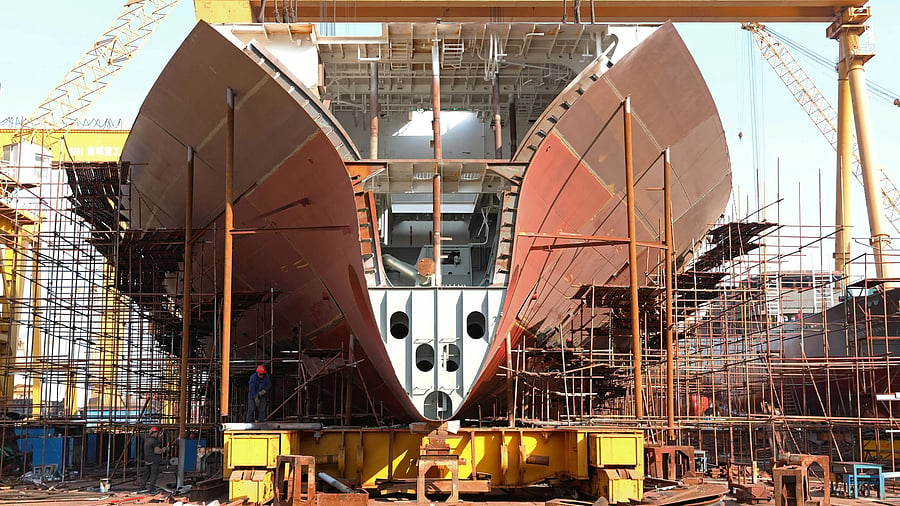
File photo for representational purpose.
Credit: Reuters photo
Last month, the Union Cabinet approved a Rs 69,725 crore package to revitalise India's shipbuilding sector, and establish India as a global hub for ship manufacturing, repair, and maritime innovation.
This initiative is more than just a fiscal stimulus; it is a blueprint designed to position India among the top global shipbuilding countries.
India’s current standing in global shipbuilding is tenuous, ranking 19th to 22nd with a market share of less than 1 per cent! In the interim, the global market is controlled by giants such as China, South Korea, and Japan, which collectively control an astonishing 93 per cent of the market.
This global dominance is not solely due to the presence of large shipyards; it is a testament to the fully integrated national ecosystems.
For instance, China’s shipbuilding capacity is astoundingly superior. This figure is estimated to be 884 times greater than that of India. This gap exists because Indian shipyards face costs that are 25-30 per cent higher than those of their competitors.
India’s shipbuilding industry faces numerous challenges, including an inconsistent policy environment, high capital costs, a shortage of skilled labour, and outdated infrastructure.
The expansion of private shipyards is impeded by financial and regulatory constraints, while public sector shipyards frequently encounter bureaucratic impediments. The shipbuilding industry's expansion, job creation, and trade security necessitate this urgent package of assistance.
Indian shipyards need to improve their scale and technical capacity, while the supply chain for advanced components remains import-dependent. The supply chain for ship components, including high-grade steel and propulsion systems, remains import heavy.
In addition to these concerns are environmental pressures. The global maritime sector is transitioning rapidly toward green shipping with international mandates on emissions. Therefore, it is crucial to establish a robust innovation ecosystem.
The path to global shipbuilding dominance requires creating dense, localised maritime clusters along our extensive coastline, replicating the comprehensive networks seen in South Korea and Norway.
Shipbuilding is often called the ‘mother of heavy engineering’, requiring a robust network of ancillary units.
Currently, the lack of strong ancillary industries means Indian shipyards must heavily import crucial components such as propulsion systems and machinery from Europe, Japan, and the United States. This reliance drastically increases repair costs and leads to turnaround times 1.4 to 1.6 times longer than global yards.
India needs MSMEs and dedicated steel-making units that cater to the high-grade material demands of the maritime sector, drawing lessons from South Korea’s model of supporting ancillary industries through R&D and incentives. All these units must be located within the local vicinity of the larger shipbuilding ecosystem surrounding the shipyards.
Crucially, this ecosystem must be anchored by strong knowledge institutions. India currently boasts the third-largest number of maritime education institutions globally. Yet, many of these educational and research institutions operate independently, with minimal industry collaboration, leading to a shortage of technological advancement and low knowledge sharing.
For instance, the Kochi Shipyard is surrounded by a plethora of educational institutions that specialise in naval architecture, fisheries, and maritime security, while Gujarat has institutions that focus on maritime law and finance. The government should promote the involvement of the private sector in nearly every aspect, as it is a capital-intensive and hybrid ecosystem that requires nurturing.
The ripple effects of this shipbuilding package extend to all the coastal states; for instance, Karnataka's maritime infrastructure, particularly the New Mangalore Port — one of India's major ports handling significant cargo volumes — stands to benefit from enhanced ship repair facilities and ancillary manufacturing networks that could emerge along the western coast.
The smaller ports of Belekeri, Tadri, and Honnavar, currently underutilised, could find new purpose as satellite nodes in a regional maritime cluster, providing specialised services or becoming hubs for component manufacturing and logistics support.
It is imperative to establish a Maritime Innovation Fund to facilitate the development of digital ship designs, research and development, and green technologies. Skilling programmes under Skill India should be expanded to include marine engineering, ship design, and retrofitting for environmental compliance.
The Cabinet’s shipbuilding package attempts to correct the existing imbalances with a targeted and multi-layered strategy.
Additionally, the objective is to establish a maritime industrial value chain. By providing direct financial incentives to domestic shipyards, the package aims to neutralise the cost disadvantages Indian firms face compared to their global competitors.
The designation of shipbuilding as an infrastructure sector will increase long-term investment flows, while credit assurance mechanisms will make financing large orders more feasible.
The package is in accordance with the nation's flagship initiatives, such as Sagarmala, which is intended to modernise ports and establish connections with manufacturing hubs, and PM Gati Shakti, which focuses on the development of multimodal infrastructure.
In general, the sector will create millions of employment opportunities and significantly stimulate the local and national economies.
The package offers a historic opportunity to fortify India's shipbuilding sector and align it with the demands of the 21st century. We must act swiftly and decisively to seize this momentum to build a maritime nation.
D Dhanuraj is chairman, and Dhritishree Bordalai is senior research associate, Centre for Public Policy Research, Kochi.
(Disclaimer: The views expressed above are the author's own. They do not necessarily reflect the views of DH)